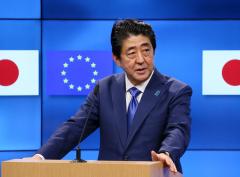

The shock landslide defeat of PM Shinzo Abe’s Liberal Democratic Party (LDP) in the recent Tokyo metropolitan elections — and the triumph there of Tokyo Governor Koike’s new party (Tomin First) — has lit a faint hope that the radical Japanese monetary expansion policy could be on its way out. The flickering light though is not strong enough to soothe the mania in Japan’s carry trades and so the yen continued to slide in the aftermath of the elections. Between mid-June and early July, the Japanese currency depreciated by some 5% against the US dollar and 10% against the euro.
The perception in currency markets is that Japan will not be embarking on monetary normalization this year or next, in contrast to Europe where ECB Chief Draghi has hinted that the train (to monetary normalization) will start next year, even though the journey promises to be very slow. The US train to normalization continues at a glacially slow pace including some periods of reverse movement. Moreover, the monetary climate prior to the journey commencing is even more extreme in the case of Japan than in Europe or the US.
It was possible to imagine that the shock election setback for the LDP could have caused Shinzo Abe to withdraw support from his money-printer in chief, Bank of Japan governor Haruhiko Kuroda (whose term ends in April 2008), thereby signaling an early end to negative interest rates and quantitative easing. But markets in their wisdom have concluded this is not to be. Many elderly Japanese are pleased with their stock market and real estate gains even though they complain about negative interest rates and the threat of inflation. In any case, it was young voters, responding to the stink of alleged corruption scandals, who turned out en masse for Governor Koike’s new party.
In fact, the widespread prediction is that PM Abe will nominate an even more radical monetary experimenter to the head of the Bank of Japan along with two deputy governors of similar persuasion. Some political pundits in Tokyo suggest that Shinzo Abe could yet face a challenge in an LDP leadership election in September 2018 and that ex-Defence Minister Shigeru Ishiba (also on the nationalist right of the party) could prevail. Ishiba-san would favor, some speculate, a return to monetary orthodoxy. But in market terms, this is a long time ahead and much further monetary damage will have been done first.















